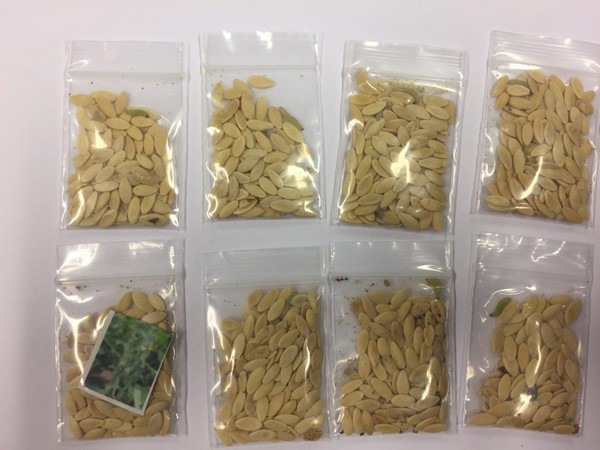Global online shopping has boomed in recent years, and there are some parcels that can have a detrimental effect on Australia’s biosecurity system. Seeds and other plant material purchased overseas have the potential to harm its horticultural industries – including vegetables – with unwanted pests and diseases entering the country. Australian Chief Plant Protection Officer, Dr. Gabrielle Vivian-Smith, outlines these threats and how they are being managed. Indian Meal Moth larvae (‘grubs’) in cucumber seeds.
Indian Meal Moth larvae (‘grubs’) in cucumber seeds.
"Seeds that are bought online from overseas can pose a significant biosecurity risk for Australia. They can carry a range of diseases – including viruses, exotic insects, and weed pests – that could impact Australia's fresh produce industries, backyard gardens, and environment," Vivian-Smith says. "Australia has strict conditions for seed imports, and these are in place to manage the significant risks. Some seeds cannot be imported to Australia as the risk of introducing unwanted plant diseases and serious weed species is too high. Others can, provided you meet strict import conditions."
The mail on seeds
Seeds are the most intercepted biosecurity risk item through the mail. In 2020, over 55,000 intercepted mail articles contained seeds – equating to 72% of the total interceptions for the period. Any of these seeds could have posed a biosecurity risk.
Since July 2020, there have also been continued reports of Australians receiving unsolicited packets of seeds from overseas. It is suspected that this could be part of an e-commerce brushing scam. As of 24 August 2021, there had been 335 cases of unsolicited seeds destined for addresses across Australia. "These seeds can also pose a biosecurity risk, as they have arrived in Australia without adhering to the appropriate import conditions," Vivian-Smith continues.

Recently, the Department of Agriculture, Water, and the Environment, in collaboration with Agriculture Victoria, conducted a research project where a range of cucumber, melon, and zucchini seeds was purchased online from overseas suppliers. These were imported under a specific biosecurity permit for testing purposes.
Disease threats
Almost 75% of the seed consignments that arrived as part of the project carried plant viruses that are a biosecurity concern. If these seeds were bought by members of the public and planted, they could have had devastating impacts. The viruses that were detected include Melon necrotic spot virus (MNSV), cucumber green mottle mosaic virus (CGMMV), Squash mosaic virus, and potyviruses. These viruses are a significant risk to Australia’s vegetable and fruit industries, as well as backyard gardens, the environment, and overall plant health. Some viruses are very hardy, and once they are present in cultivated fields, they are often there to stay.
Protecting the country
To better manage seed biosecurity risks, Australia banned imports of cucumber, melon, and zucchini seeds – as well as seeds of other high-risk commodities – through international mail last year.
"On arrival in Australia, biosecurity officers check that imported seeds are free from biosecurity risk material and meet all import conditions. Seeds that do not meet the import conditions may require testing or treatment. If the biosecurity risk cannot be successfully treated, the seeds will be exported or disposed of at the importer’s expense," Vivian-Smith says. "Illegal imports of seeds can be subject to enforcement action by the department. There are significant penalties if you are found to have breached Australia’s biosecurity conditions. This can include fines and potential prosecution.
"The recent testing of seeds from overseas demonstrates the reality of the risks that Australia is potentially facing. It is a vital reminder that we all need to play our part and not purchase goods from overseas that could be a biosecurity risk."

 For more information:
For more information: